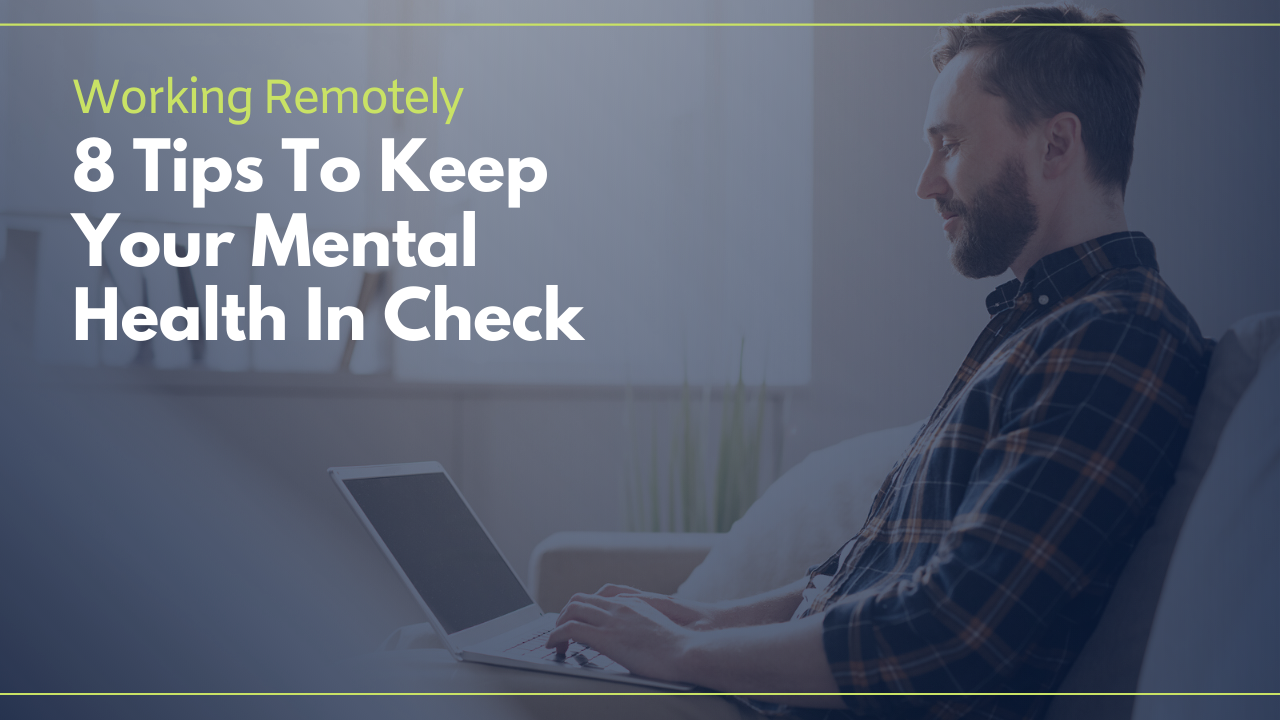- Many office-based workers are now suddenly working remotely, from home.
- Making the switch from an office to a home environment can be mentally tough.
- These 8 tips will help make the transition to home-based work a little easier.
Over the past couple of weeks there has been a drastic increase in the number of people working from home. While working remotely has increased in popularity over the past few years, the reality is that working from home is not as easy as it seems.
Working from home is challenging enough as it is, and if you add a partner, kids, pets, and a global pandemic to the mix, well… it just becomes that much more difficult to manage.
COVID-19 Impact on Mental Health
Even if you haven’t been directly affected by the coronavirus, it’s likely that you’re dealing with stress and anxiety from it.
This is normal.
The world is dealing with an invisible threat, one that’s entirely disrupted our day to day lives and our sense of normality. To make matters worse, no one knows what will happen. We’re all living with uncertainty.
Uncertain of whether or not we will become sick. Uncertain of whether we will lose our jobs. Uncertain of how this will impact our personal finances. Uncertain of how long it will take for a vaccine to be found. Uncertain of how long the pandemic will last.
And while dealing with all of the above, some of us — those who have been lucky enough to be allowed to work remotely — also have to deal with our workload and figure out how to work from home without losing our work-life balance.
8 Tips to Keep Mental Health in Check if You’re Suddenly Remote
1. Be kind to yourself
Start by acknowledging that working from home is not at all like working from the office, so you need to be kind and patient with yourself. It will take some time for you to find your rhythm, establish a routine, and be disciplined about not checking the news every 5 minutes.
2. Keep the news in check
While information is great, it can have a negative toll on our mental health. Sometimes rather than ease our emotions, the news about the pandemic can make them worse, increasing our stress and anxiety levels. This is why it’s important that you don’t check the news every five minutes and that you pick your news sources carefully. If you want to stay on top of what’s happening, consider setting some time in the morning and in the evening that’s dedicated for you to check the news.
3. Take a shower and dress the part
We cannot stress this enough: don’t underestimate the power of a shower and the right clothes. Simply showering and getting out of your pijamas will help you get in the right mindset to work. More importantly, it will help you stay in the right frame of mind. Showering in the morning will give you a boost of energy and a positive clean, refreshed feeling.
We know, it sounds easy enough, but it’s not. Pro tip: if you’re up for it, take a cold shower or at least splash some cold water on your face before you step out.
4. Don’t work from your bed
This is a major thing. You really don’t want to bring work to bed or you’ll start associating your bedroom with work, and honestly, who wants that? More importantly, it will make it harder for you to focus on the tasks at hand and you’re much more likely to fall asleep; which will then lead to a vicious loop where you feel guilty for not getting up and not doing as much work as you wanted… it’s really just not worth it.
5. Set up a home office
It doesn’t have to be an entire room, it can be a corner in the living room or somewhere in your balcony or garden if you have one. The goal is for you to have a space within your home that you will associate with work. It will make it easier to set up a routine and will help you keep some work-life boundaries.
6. Socialize, virtually
One of the main challenges associated with remote work is isolation. If you find that you’re missing the social bond you had with coworkers in the office or that you just need some chatter to motivate you to work, consider using group chats or video calls more frequently. Some organizations have created virtual workspaces where people can connect and disconnect as they need.
7. Take regular breaks
Take breaks throughout the day as you do in the office. Stand up, go for a walk, eat a light snack, do some deep breathing exercises, check in on your kids, partner, pet, or roommate; or do a quick home exercise or yoga routine.
8. Get enough sleep
Sleep and mental health are closely connected. Being sleep deprived can negatively impact our psychological state, including stress and depression, among others. Take advantage of the fact that you no longer have to commute to the office, so try to clock in a few extra minutes (or hours) of sleep.
Valuable Resources
- Here is a list of mental health information and resources should you need additional help coping with stress and anxiety during this time.
- Here is a list of 5 effective strategies to manage stress, work related or not.
- Here are additional sources from the American Psychiatric Association, scroll to the Resources for Families section.



 Dr. Gleb Tsipursky – The Office Whisperer
Dr. Gleb Tsipursky – The Office Whisperer Nirit Cohen – WorkFutures
Nirit Cohen – WorkFutures Angela Howard – Culture Expert
Angela Howard – Culture Expert Drew Jones – Design & Innovation
Drew Jones – Design & Innovation Jonathan Price – CRE & Flex Expert
Jonathan Price – CRE & Flex Expert














